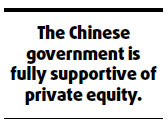

NEW YORK: The flow of foreign capital into China from offshore investment firms dwindled during the first quarter of the year. But private equity professionals still see China as one of the most attractive areas for investment in the world.
Investment professionals from around the world gathered at the Westin Hotel in New York last week to discuss the investment climate in China during the financial downturn at the 2009 China Venture Capital & Private Equity Forum.
Zero2IPO, a market research and financial advisory firm that hosted the conference, revealed new data showing that foreign-based venture capital and private equity investment in China has dropped significantly during the first quarter of the year.
The number of venture capital deals in the first quarter was 53, barely more than one-third the 153 deals reported during the same period last year. The number of private equity deals stood at 19, less than half of the 41 private equity deals struck during the first quarter of 2008. The value of the deals in venture and private equity has also declined.

Fundraising for new pools of investment capital dropped to about $889 million in the first quarter, compared to $2.27 billion during the same quarter last year. And the domestic market to take private companies public on the Shanghai and Shenzhen stock exchanges has remained closed in China while it is being reformed, according to the report.
"It's been very, very tough," said Gavin Ni, founder and CEO of Zero2IPO. "The global financial crisis is affecting China. But valuations are also going down so it's a good time to make investments."
Despite the slowdown on the investment side, China still represents a good investment opportunity compared to the rest of the world, as the country's economy grew by about 6.1 percent in the first quarter. As China grows, hundreds of millions of new workers will be added to the workforce with money to spend in the domestic economy, investment professionals at the conference said.
This growth makes consumer-driven businesses attractive investment opportunities for private equity and venture firms. About 400 million households in China have at least one television, according to Andrew Yan, managing partner with SAIF Partners, a private equity firm that invests in China. The Internet and mobile technology combine for a market of about 1 billion customers, according to Hugo Shong, founding general partner with IDG VC.
"We see a lot of opportunities to invest in companies that provide services that reach 1 billion people," Shong said. "It's a huge market."
As long as China keeps growing, sectors such as consumer goods will thrive. The downturn has caused sellers of businesses to cut their prices, creating a flood of attractive deals to private equity and venture firms, Yan said.
But there are still roadblocks to private equity in China. For one thing, there is no market right now for firms to cash out of their investments through IPOs, Yan said. "In the next three years, the exits (from investments) will be offshore," he said.
And while China is rife with deal opportunities, many investment firms have turned inward to tend to their existing companies, rather than seek out new opportunities in the downturn.
Still, the Chinese government is fully supportive of private equity, viewing it as an important means of financing for businesses, according to Cao Wenlian, deputy director of the department of finance and fiscal affairs with the National Development and Reform Commission.
Gao said at the conference that the Chinese government is discussing ways to encourage foreign-based private equity and venture firms to establish investment funds. Along these lines, the Chinese government is also working on regulations and policies for institutions in China, such as banks, to become investors in private equity and venture funds, Gao said.
Currently, one large investor - or limited partner - in private equity in China is the social security fund.
(China Daily 05/11/2009 page4)













